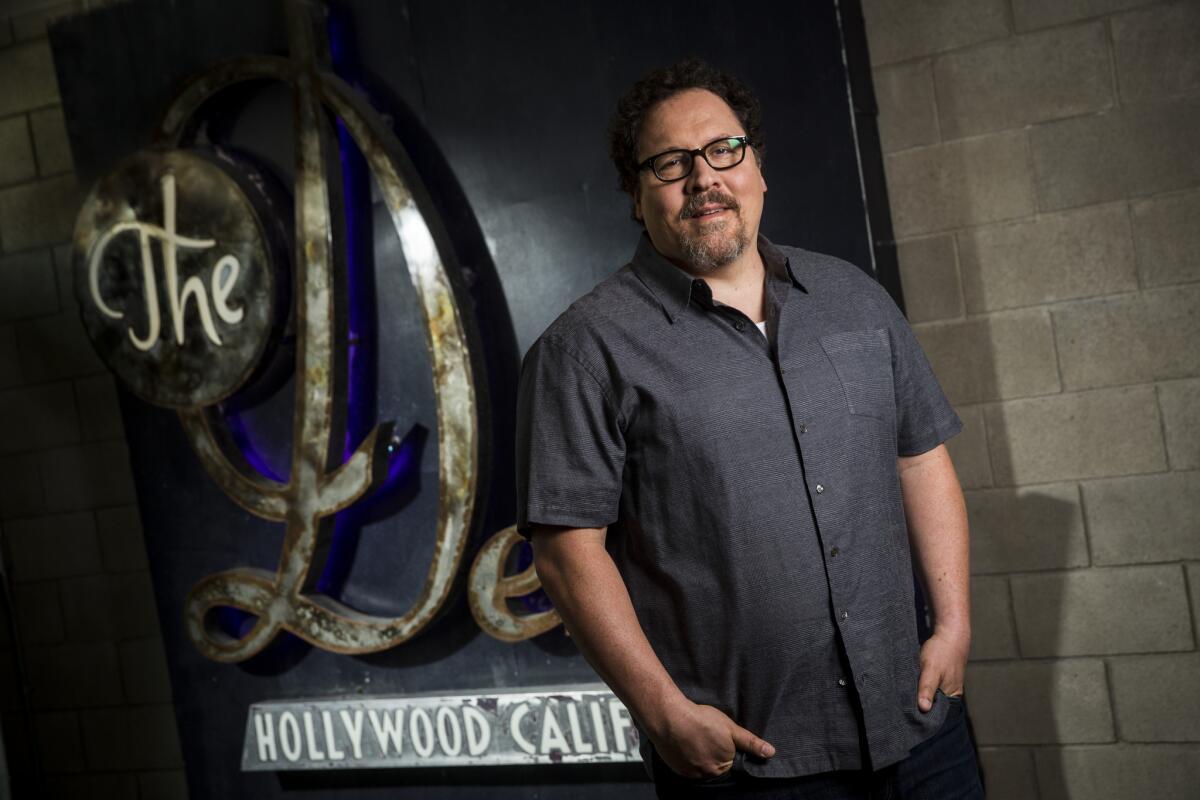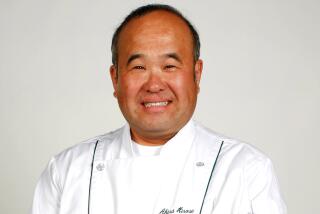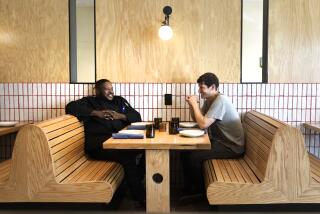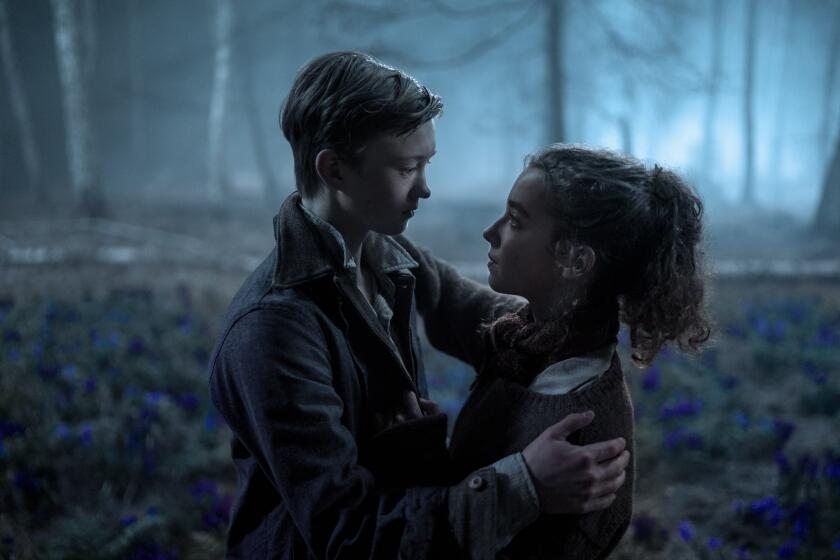Jon Favreau stirs the pot with ‘Chef’

Had it been a slasher film, Jon Favreau would have been playing the deranged murderer.
With a knife clenched in his hand, the “Iron Man” filmmaker was attacking a filthy stainless-steel hotel tray — what an amateur cook might call an oversized cookie sheet — trying to pry off a thick crust of baked-on greasy food scraps.
It was the 17th day of filming last July on “Chef,” a personal love letter to cooking that Favreau wrote and directed. He also stars in the independently financed $11-million comedy as Carl Casper, a talented but hotheaded cook turning out safe dishes like French onion soup and chocolate lava cake at a Los Angeles restaurant more interested in pleasing its customers than in taking any gastronomic risk.
“You should play your hits,” his boss tells Casper, perhaps echoing words Favreau might have heard from a studio head or two.
After Casper has a spectacular falling out with the restaurant’s owner that quickly becomes public via social media, he decides to reinvent himself as a cook, a parent and a person by converting a beat-up food truck into a high-end movable panini grill serving Cubanos, or pressed-pork sandwiches.
“Yell at me if I’m doing it wrong,” Favreau said between takes during filming in the storage yard of Monte Collins Backhoe in Los Alamitos. He was directing his remarks to Roy Choi, the Los Angeles food truck trailblazer who was serving as the film’s food consultant.
“I want to make it look harder than it is,” Favreau said.
“I think you’ll have better success if you hold it like the guy in ‘Psycho,’” Choi replied.
Favreau regripped his knife like Anthony Perkins in the film’s famous shower scene and went back to hacking the detritus out of the pan.
The scene lasts but a few moments in the finished film, which also stars John Leguizamo, Sofía Vergara, Scarlett Johansson, Robert Downey Jr., Dustin Hoffman and Oliver Platt. But cleaning the hotel tray properly was symbolic of how Favreau was determined to get the smallest details right, from how prep cooks chop onions to how you should handle a fresh baguette (you can hold it suggestively, but don’t ever fondle it).
The care with which Favreau, who also trained as a chef before making the movie, constructed “Chef” is seemingly paying off with critics: Early reviews of the film, which opens Friday in limited release, are among the most favorable of the season. If the movie were a food truck, lines would start forming now.
For Favreau, who made his directorial debut with 2001’s low-budget “Made” after writing and starring in the 1996 art-house hit “Swingers,” “Chef” represents a return to a more authentic but rapidly vanishing style of filmmaking: movies made on a smaller scale, free from studio interference, executive casting notes and out-of-state production rebates that would have forced Favreau to abandon shooting “Chef” scenes in Austin, New Orleans and Miami. (He turned down one financier who insisted on shooting the film entirely in Atlanta, a move that would have killed a critical story turn in which Casper takes his food truck on a transcontinental tour.)
Had he made “Chef” at a studio, Favreau furthermore said, he wouldn’t have been able to cast himself in the lead role, chefs couldn’t swear as much in the movie as they really do in real life and he’d have to trim some 10 minutes of cooking from the finished cut.
Too many cooks, not surprisingly, are just as much a problem in Hollywood as they are in a kitchen.
There’s a throwaway line in “Chef” about how much Favreau weighs, and his passion for good food — coupled with worrying about hurting a chef’s feelings by sending an unfinished dish back to the kitchen — that helps explain his heft. He says he was always interested in chefs as characters, and the more he thought about the parallels between what they do and what a filmmaker does, the more “Chef” came into focus.
“I’ve been working on big movies for a long time and I wanted to do something personal,” Favreau said during a break during filming in Los Alamitos. “I hadn’t done something like ‘Swingers’ that was about someone at my stage in life — all the lessons you’ve learned about your life, about your family, about your career. But my life isn’t relatable. If I wrote about myself, it would be some cry-me-a-river story: ‘My kid didn’t get into the right private school!’ But chefs and filmmakers are both egocentric, and the diner and the audience are the same. If they are not happy with what you send out, you haven’t done your job. The job is to make other people happy.”
And happy was exactly what Favreau was a few weeks after filming wrapped, as he arrived at the Factory Kitchen, one of Los Angeles’ hottest restaurants, and chef Angelo brought out cremosella, creamy mozzarella drizzled with Ligurian olive oil; flatbread pizza with crescenza cheese, imported ham and rosemary; two pasta dishes, including the restaurant’s celebrated handkerchief-shaped noodles with almond pesto; turkey meatloaf; marinated lamb brochettes and a plate of desserts that included cannoli, panna cotta and gelato.
“Oh my God.” “Look at this.” “Perfect.” “Wow.” “Magical.” “This just melts in your mouth.” “I know you’re allergic to nuts, but this pesto might be worth a trip to the hospital.” “Can we get some more of this?”
By the fourth course, Favreau was running out of adjectives and compliments, but not room for more. As vigilantly as he explored the dishes, trying to puzzle out the ingredients and cooking style, he also kept an eye on the kitchen and the wait staff.
“For a chef to get this back,” Favreau said, pushing forward a plate that bore absolutely no traces of the pasta that was on it five minutes earlier, “is the highest compliment.”
When he finally reached his caloric limit and the lamb was only half consumed, he told a waiter, “I want the chef to know the reason we are not finishing this is not because we didn’t like it, but because we ordered three times too much food. Make sure you tell them that, please.”
Favreau, whose last film was 2011’s critical and commercial washout “Cowboys & Aliens,” said that whenever someone gets up during a test screening, even if they are just going to the bathroom, he experiences the same panic a chef might feel when an entree is returned uneaten. “A chef lives for feedback, for a connection. They want to make people happy. And they are perfectionists. You never hear anybody in the kitchen of a top restaurant say, ‘What’s the difference?’”
It’s a lesson the movie business could follow, of course.
But it isn’t always easy. For his next movie, a reworking of “The Jungle Book” for Disney, the 47-year-old Favreau may be challenged to make as personal a film as he did with “Chef,” given the huge stakes behind the big-budget enterprise film. For now, he’s hoping “Chef” will be as enjoyable as a great meal. “I want people to go see the movie and like it,” he said, finishing off a cannoli. “And I want the movie to make a difference in their lives. Movies can do that, in a small way.”
More to Read
Only good movies
Get the Indie Focus newsletter, Mark Olsen's weekly guide to the world of cinema.
You may occasionally receive promotional content from the Los Angeles Times.











